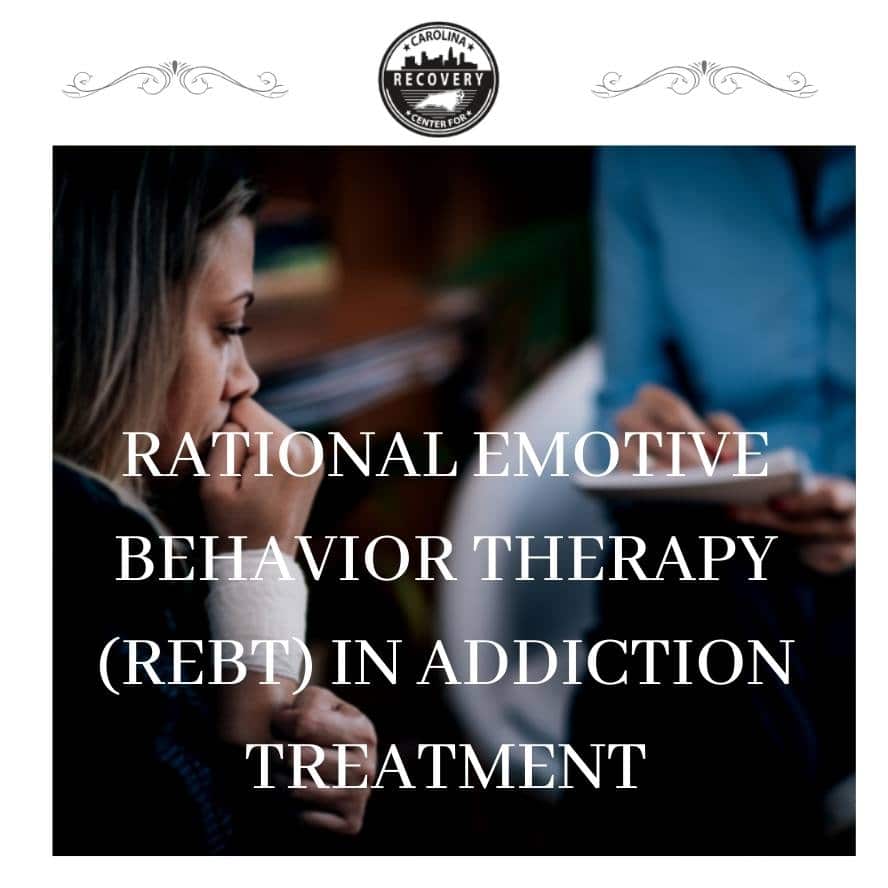Rational Emotive Behavior Therapy (REBT) in Addiction Treatment

Medically Verified: 2/1/24
Medical Reviewer
Chief Editor

All of the information on this page has been reviewed and verified by a certified addiction professional.
Addiction treatment programs in North Carolina often use a variety of different therapies to provide a comprehensive, “whole-patient” approach. Many of these therapies are behavioral therapies that seek to change the behaviors and thought processes of people struggling with addiction. One of these behavioral therapies is called Rational Emotive Behavior Therapy or REBT.
REBT was founded in the 1950s by Albert Ellis, PhD, a psychologist, and New York City native. This therapeutic approach is considered the pioneering form of cognitive-behavioral therapy (CBT).[1] Today, Rational Emotive Behavior Therapy is used in addiction treatment to help patients replace their unhealthy beliefs with ones that serve their goals in sobriety.
What is Rational Emotive Behavior Therapy (REBT)?
Rational Emotive Behavior Therapy (REBT) is a type of psychotherapy or talk therapy that is used in addiction treatment to help patients change their thinking in a manner that encourages healthy behaviors and belief systems. Since substance abuse is usually a direct result of maladaptive behaviors and thoughts, this approach can help teach individuals how to change their thinking and actions.[2]
REBT is formulated around the belief that many people have irrational thoughts and belief systems about their lives. The problem is, without professional help, people are unable to identify their own irrational thoughts. While their friends and family may be able to see that they are acting irrationally, the person themselves does not think anything is abnormal.
Irrational thought patterns can lead to feelings of guilt, shame, defeat, inadequacy, or failure. These feelings can promote substance abuse, self-harm, depression, anxiety, and so much more. REBT helps patients realize and shift their irrational beliefs so they can create more attainable goals while decreasing destructive behaviors.
REBT in Mental Health Treatment
Rational Emotive Behavior Therapy (REBT) is used in addiction treatment to address not only substance use disorder but also a variety of mental health conditions. REBT can be used in the treatment of:
- Depression
- Anxiety
- Phobias
- Obsessive-compulsive disorder
- Addictive behaviors
- Eating disorders
- Anger management issues
How Rational Emotive Behavior Therapy Works in Addiction Treatment
REBT takes an approach that states a person’s beliefs surrounding certain events are what make them upset – not the event itself. Using this approach, it can be said that substance abuse is a result of counterproductive thoughts, feelings, and behaviors. REBT aims to destroy these habits by replacing them with more positive belief systems and coping mechanisms.[3]
The ABC Model
REBT functions around the basic principle that people interpret events based on how they react to said events. The way in which thoughts and beliefs influence responses to events can be described using the ABC model.
- Activating event/Action – Something happens, such as an event, situation, or traumatic experience that directly affects an individual.
- Belief – In direct response to the event, the individual forms a belief or set of beliefs about the event that occurred.
- Consequence – The belief triggers a specific emotional response that changes the way a person acts or behaves in future situations.
During rational emotive behavior therapy sessions, addiction treatment specialists focus on helping clients identify the A, B, and C regarding certain situations in their lives. The goal is to help clients see how their behaviors and beliefs are connected to past events that happened to them. This can help patients become aware of how their personal beliefs influence their emotional and behavioral responses.
REBT Processes To Treat Addiction
REBT is often incorporated into the group and individual therapy sessions. A unique, four-step process is used in REBT to help patients learn to analyze their own reactions, thought patterns, and belief systems that cause emotional distress. This process involves:
- Helping patients identify irrational beliefs that they hold that are not consistent with reality.
- Encouraging patients to challenge their irrational beliefs to determine whether or not the beliefs are valid and true.
- Helping patients gain insight into their beliefs and analyze them to determine how their beliefs lead to their emotions and whether or not these emotions are logical.
- Promoting the replacement of negative beliefs with positive ones to try and get patients to think differently and have more healthy and positive belief systems.
This process is very similar to that of cognitive-behavioral therapy (CBT). However, CBT focuses on behaviors that come from negative thought patterns, while REBT focuses on the emotions that are felt as a result of negative belief systems.
Start Addiction Treatment in North Carolina Today
Rational Emotive Behavior Therapy (REBT) enables patients to manage their reactions to triggering events by encouraging healthy and rational thought patterns. It can be used to address maladaptive coping mechanisms, thought processes, and mental health conditions experienced by people who suffer from addiction.
If you or a loved one are struggling with addiction or co-occurring disorders, specialized treatment that involves REBT and supportive care can help you recover. Contact one of our addiction specialists at Carolina Center for Recovery today to get started.
References:

